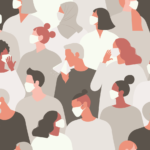This essay is part of a series concerning the Coronavirus pandemic. Read more from the collection here.
If the outsized reaction to the coronavirus has shown us anything, it is that humanity’s dual instincts of cooperation and coercion are manifest as we grope our way back to regular life. The coercion is manifestly evident. One need look no further than the governors who can’t seem to wait to clamp down on their own citizens. California’s Gavin Newsome has ordered everyone to stay at home. Pennsylvania’s Tom Wolf has ordered that all non-life-sustaining (whatever that means) businesses must close. And any number of other governors have shut down schools, bars, and gatherings bigger than a poker game.
But as sure as we are facing the highest levels of coercion in living memory, we are also seeing a degree of cooperation that is every bit as profound. We can look to the Trump administration for the first evidence. Vice President Mike Pence recently announced that medical professionals will no longer need separate licenses to practice medicine across state lines. This change has the potential to release medical professionals from areas in which the infection rate is lower to work where rates are higher. The underlying and extremely sane message is that, when it comes to caring for the sick, doctors are more expert than government regulators. We would be better off cutting through years of built-up red tape to let them ply their craft as they see fit.
Not to be outdone, the Department of Health and Human Services announced that it would waive licensing requirements, thereby permitting physicians to provide telemedicine services across state lines. All kinds of maladies don’t really require patients to go to a physical doctor’s office, and now the federal government won’t require it either. Who wins here? Just about everyone, actually. The sickest will see shorter wait times. Those less so will not be exposed to the sickest. And doctors won’t have to worry about twentieth-century rules limiting their twenty-first-century practices.
Start your day with Public Discourse
Sign up and get our daily essays sent straight to your inbox.The Food and Drug Administration has gotten in on the action too, announcing that it is relaxing regulations in order to allow companies producing COVID-19 test kits to bring them to market immediately. By contrast, the process of navigating a new product through FDA testing usually takes months. And it’s not just medical regulations that are being relaxed. The Department of Transportation has suspended rules limiting the number of hours truckers can drive per day. With these restrictions lifted, truckers can get needed products to their destinations faster. This will come as welcome news to people looking at empty supermarket shelves.
If these regulations can be dismissed so readily by those who put them in place, we are left with the obvious question: Why do we have these regulations in the first place? And this is a great question to press in the months that will follow our current predicament. For now, it does us well to keep our eyes firmly on the relaxing regulatory grip before us, because every time we see the coercive grip of government loosen, we see a corresponding increase in cooperation between and among people on the ground. And while this cooperation is most evident where government relaxes its involvement, it is most meaningful where government was never involved in the first place.
A Surge in Cooperation
The surge in cooperation started with little things, like one man’s effort to make sure Ethiopians in Seattle who couldn’t speak English had accurate information from the Centers for Disease Control. Seeing a gap, Yadesa Bojia took to Facebook Live, where he translated the CDC’s advice into Amharic. It turns out that Bojia is far from the exception. People are offering free babysitting service, sometimes for healthcare professionals, sometimes just generally. People are volunteering to go to grocery stores for the elderly and infirm. People are packaging lunches for students whose only food came from their schools, most of which are now closed. In perhaps the finest PR move of all time, the Grub Burger Bar in Atlanta even started offering the hottest commodity in the country, toilet paper, to their customers from their commercial stocks. The price? A shocking $3 for four rolls.
These are by no means isolated incidents, and they shouldn’t even really be surprising. When times become difficult, people come to help each other as a rule. It’s not really a case of our better angels emerging; it’s our regular angels doing what they almost always do when the chips are down. We are a deeply cooperative species.
Walmart hasn’t closed its doors. The retail giant has instead cut back to essential products and reassigned workers from less important departments to things people need right now. Amazon has added a hundred thousand or so temporary employees to get much-needed food and supplies to customers all over the country. Just a few months ago, politicians were decrying Amazon and Walmart as exploitive companies and their founders’ wealth as something that was undeserved and should be redistributed. Yet, in crisis, Amazon and Walmart have become the lifeblood for American households. They are, to say the least, good corporate citizens.
Perhaps most surprisingly, professional sports team owners like Mark Cuban continue to pay their employees even as gate receipts have dropped to zero. “I reached out to the folks at the arena and our folks at the Mavs to find out what it would cost to financially support people who aren’t going to be able to come to work—you know, they get paid by the hour, and this is their source of income,” said Cuban. “We may ask them to go do some volunteer work in exchange, but we’ve already started the process of having a program in place. I don’t have any details to give, but it’s certainly something that’s important to me.”
As if on cue, grocery stores around the country started reserving their first open hour of the day for the elderly and otherwise immunocompromised. Why the first hour? That’s when the stores are cleanest, the shelves are fullest, and the lines are shortest. All of this is happening without a shred of governmental coercion. Left unchecked, this is what “cold-hearted” capitalism leads to, more often than not.
Do we see counterexamples? Sure. There are any number of employees in non-essential positions that are being compelled to go to work. There are reports of everything from Facebook contractors to mail carriers being told they must report, physically, to their worksites. But on balance and in the large, though, we are seeing a tremendous reorganization of the workforce emerging on the fly. And it’s downright impressive, even if it isn’t perfect.
Get the Balance of Coercion and Cooperation Right
In the end, every story we tell, in difficult and easy times alike, is a story about human nature. And human nature manifests in both coercive and cooperative ways. Some level of coercion is absolutely necessary, just as government itself is necessary. But we do well not to fall into the trap of confounding government with civil society. Tom Paine had it right in Common Sense in 1776: “Society in every state is a blessing,” he wrote, “but Government, even in its best state, is but a necessary evil. . . . Government, like dress, is the badge of lost innocence.”
The hallmark of civil society is cooperation, which is what we should all be thinking about at times like these. The coronavirus defines our collective life at present, but cooperation defines our collective life as a rule. Always. When our knee-jerk reaction to immediate problems is to coerce, as is so often the case, we push the obvious solutions to our problems into the background. And still, people cooperate.
Almost always, the best thing government can do is to get out of people’s way. This will come as hard news to politicians who honestly believe they can solve everyone’s problems with the right policy adjustments. Thankfully, for every governor declaring what people can or cannot do, there are thousands of regular people doing what regular people have always done: cooperating.














